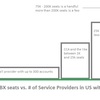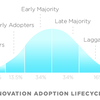VoIP originally was sold as the answer to the next wave of cost savings for consumers and especially for small business. Business phone lines have always cost more than residential lines because, in theory, businesses use the phone line more often. (I guess, if you have 2 teenagers then that equals 1 small business).
Now that businesses are looking for ways to cut costs, analysts are predicting a rise in VoIP sales. Maybe. Define VoIP. Hosted PBX certainly offers an attractive ROI, but to take full advantage of it, there is an upfront CAPEX (capital expenditure) that includes: IP Phones, cabling, POE switch, and some form of IAD or QOS Router like an Edgewater. A lease could alleviate some of this, but Voxilla agrees with me on the CAPEX question.
If we are talking about the myriad apps that offer VoIP on the cell phone, I have to ask, why? These apps don't work on every handset. These apps either use up minutes (on callbacks) or data. It seems that it would be cheaper to bulk up the minutes than go through the trouble. But Gary Kim writes that the small business segment will move mainly to cellular IF the iPhone can become like the desk phone. I guess people like to ask, "Huh? What? you cut out there." Or more likely they aren't paying attention any way so don't care about call quality, dropped calls, or dead batteries.
VoIP mainly makes sense when there is a lot of inter-branch calling. Or when there is a virtual office, tele-workers, or other location varied need.
While SIP Trunking is the new buzz word, it is sold primarily as a PRI replacement, which makes no sense to me. TDM and PRI are tried and true. You might save 10%, but so what? SIP Trunking isn't a standard so it may or may not work with your PBX IP card, depending on carrier and implementation. And how much cheaper do you think long distance will be on a SIP Trunk versus a PRI?
If the SIP Trunk is a means to extend the life of a IP-PBX as well as add SIP overlay features, that would be a better offer, but that isn't the "I'll save you 10%" deal that most folks tout.
Overall, cellular will probably win for the mobility.
agents apps att broadband broadsoft cable cableco cellular channel partners clec cloud communications cloud computing commissions data center FCC fcc fiber financials hosted pbx internet itexpo marketing master agency mergers politics sales security sellecom selling strategy TCA telecom is broken UC unified messaging VAR voip vz vzw wireless wireline
- AI (4)
- Add category (2)
- BPI (10)
- BPaaS (10)
- CALEA (2)
- CLEC (250)
- FCC (200)
- FTC (10)
- IOT (17)
- IPTV (14)
- ISP (60)
- Internet (248)
- Marketing (283)
- PBX (180)
- PR (27)
- SDN (46)
- TCA (72)
- TEM (16)
- TMC (26)
- VAD (9)
- VAR (149)
- VDI (10)
- Web 2.0 (48)
- Yahoo (9)
- agents (446)
- amazon (23)
- apps (122)
- backup (41)
- bandwidth (70)
- bellsouth agent (22)
- books (15)
- broadband (235)
- broadsoft (124)
- cableco (200)
- cellular (243)
- certification (17)
- channel (432)
- cloud computing (286)
- colocation (43)
- commissions (103)
- communications (66)
- compliance (22)
- comptia (5)
- conferences (66)
- conferencing (68)
- crm (8)
- cybersecurity (2)
- data center (128)
- disaster recovery (35)
- duopoly (71)
- e-book (4)
- economy (129)
- email (27)
- ethernet (23)
- expo (117)
- fiber (124)
- glossary (2)
- hosted uc (266)
- im/chat (28)
- jobs (32)
- linkedin (38)
- managed services (54)
- master agency (68)
- mergers (395)
- metaswitch (12)
- mobile (57)
- mpls (55)
- msp (50)
- off topic (48)
- organizations (82)
- outage (19)
- politics (136)
- privacy (41)
- saas (92)
- sales and selling (271)
- satellite (17)
- sdn (28)
- security (94)
- sip trunking (83)
- smb (65)
- social network (76)
- spectrum (68)
- startup (27)
- technology (134)
- telco (253)
- tele-presence (22)
- telecommunications (229)
- training (42)
- twitter (44)
- unified communications (258)
- vc (9)
- video (86)
- voip (436)
- webRTC (16)
- wi-fi (29)
- wimax (33)
- wireless (167)
- wireline (179)
- xmpp (5)
- xo (54)
- September 2017
- August 2017
- July 2017
- June 2017
- May 2017
- April 2017
- March 2017
- February 2017
- January 2017
- December 2016
- November 2016
- October 2016
- September 2016
- August 2016
- July 2016
- June 2016
- May 2016
- April 2016
- March 2016
- February 2016
- January 2016
- December 2015
- November 2015
- October 2015
- September 2015
- August 2015
- July 2015
- June 2015
- May 2015
- April 2015
- March 2015
- February 2015
- January 2015
- December 2014
- November 2014
- October 2014
- September 2014
- August 2014
- July 2014
- June 2014
- May 2014
- April 2014
- March 2014
- February 2014
- January 2014
- December 2013
- November 2013
- October 2013
- September 2013
- August 2013
- July 2013
- June 2013
- May 2013
- April 2013
- March 2013
- February 2013
- January 2013
- December 2012
- November 2012
- October 2012
- September 2012
- August 2012
- July 2012
- June 2012
- May 2012
- April 2012
- March 2012
- February 2012
- January 2012
- December 2011
- November 2011
- October 2011
- September 2011
- August 2011
- July 2011
- June 2011
- May 2011
- April 2011
- March 2011
- February 2011
- January 2011
- December 2010
- November 2010
- October 2010
- September 2010
- August 2010
- July 2010
- June 2010
- May 2010
- April 2010
- March 2010
- February 2010
- January 2010
- December 2009
- November 2009
- October 2009
- September 2009
- August 2009
- July 2009
- June 2009
- May 2009
- April 2009
- March 2009
- February 2009
- January 2009
- December 2008
- November 2008
- October 2008
- September 2008
- August 2008
- July 2008
- June 2008
- May 2008
- April 2008
- March 2008
- February 2008
Featured Videos













